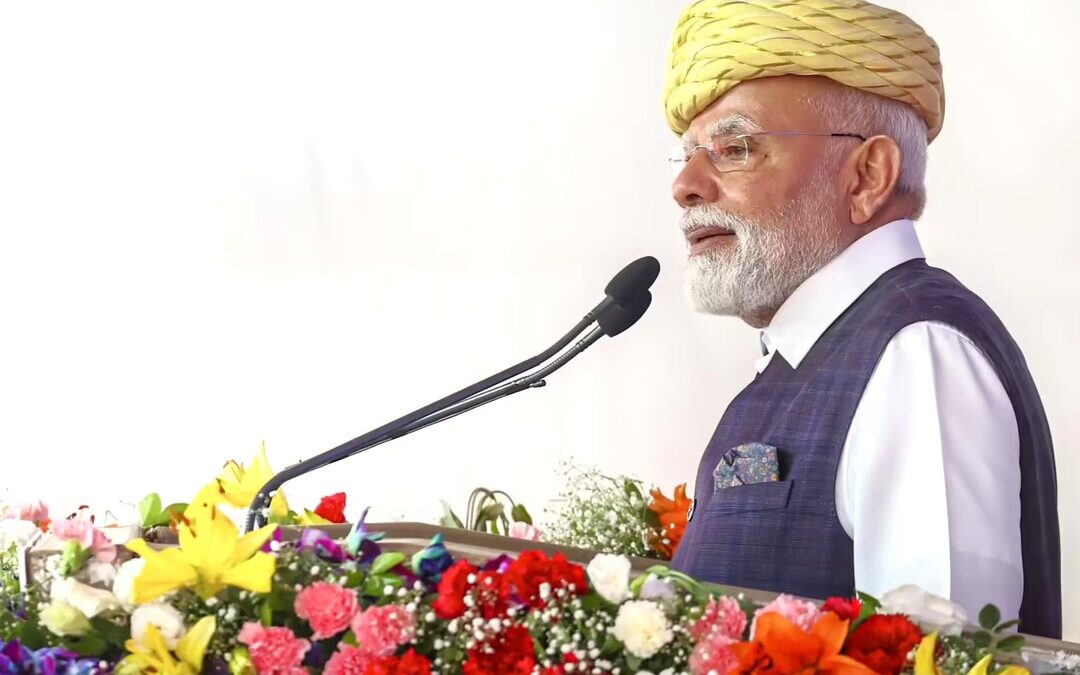PM Modi Inaugurates Avaada’s 280MW Solar Power Project in Gujarat
India expands renewable energy capacity as Modi inaugurates Avaada’s solar power projects in Gujarat and Vadodara.
Prime Minister Narendra Modi on Saturday inaugurated Avaada Group’s 280-megawatt solar power project in Gujarat and laid the foundation stone for another 100 MW project in Vadodara, signaling India’s growing momentum in renewable energy development.
The Surendranagar project, developed under the Gujarat State Solar Policy, spans 1,170 acres across Tavi and Varsani villages. With an investment of ₹1,500 crore ($180 million), it represents one of Avaada’s largest projects to date.
The facility is equipped with Avaada Electro’s Make in India TOPCon N-Type bifacial modules, certified under the government’s Approved List of Models and Manufacturers.
TOPCon N-Type bifacial modules are advanced solar panels that use N-type crystalline silicon cells with Tunnel Oxide Passivated Contact technology, designed to absorb sunlight on both the front and rear surfaces.
The use of domestic equipment emphasizes India’s strategy to boost local manufacturing capacity while reducing reliance on imports.
Electricity from the project will be supplied to Gujarat Urja Vikas Nigam Ltd., adding to the state’s renewable energy mix. The additional capacity is expected to deliver reliable daytime power to citizens and farmers, improving access and reducing dependence on conventional supply.
Vadodara Expansion
Along with the inauguration, Modi laid the foundation stone for Avaada’s 100 MW solar power project in Vadodara district. Spread across 350 acres and backed by an investment of ₹400 crore, the facility is scheduled to be commissioned by April 2026.
Avaada said the Vadodara project is designed to cut 212,806 tons of carbon dioxide emissions annually. It will also save around 4 million liters of water each year through robotic module cleaning systems, which eliminate the need for water-intensive washing methods.
Environmental and Economic Gains
The Surendranagar project is expected to generate significant environmental benefits. According to Avaada, the project will offset nearly 596,000 tons of carbon dioxide emissions annually and conserve more than 11 million liters of water. Robotic cleaning systems will help minimize the ecological footprint while ensuring efficiency.
Economically, the plant is set to enhance regional productivity. Farmers will gain access to consistent daytime electricity for irrigation, reducing their reliance on nighttime supply that often suffers from load shedding. By stabilizing the grid, the project will also lower subsidy costs for the state and reduce the need for costly conventional power during peak hours.
Avaada has tied the projects to local development programs. The company has launched free tuition classes, computer labs, cybersecurity workshops, healthcare camps and women’s skill development initiatives for students. These measures aim to deliver tangible benefits to nearby communities while fostering social inclusion.
Chairman Vineet Mittal said the inauguration marked a turning point for the company and the sector. “Our mission goes beyond generating energy—it is about contributing to India’s growth story and empowering communities,” he said.
Broader Strategy
Avaada has been broadening its clean energy portfolio across India. Beyond solar power generation, the group is expanding into solar module manufacturing, green hydrogen and its derivatives, green data centers, battery storage, and pumped hydro projects.
The company stated that its integrated approach aligns with the government’s vision of an Aatmanirbhar Bharat, or a self-reliant India. By building capacity across the energy value chain, Avaada aims to strengthen India’s position in global clean energy markets.
With the Surendranagar and Vadodara projects, the group expects to accelerate its role in India’s transition, which seeks to meet half of the country’s power needs from renewable sources by 2030.
Also Read:
Avaada, Casale to Build India’s Largest Green Ammonia Plant in Odisha
Nirmal Menon
Related posts

Subscribe
Error: Contact form not found.


